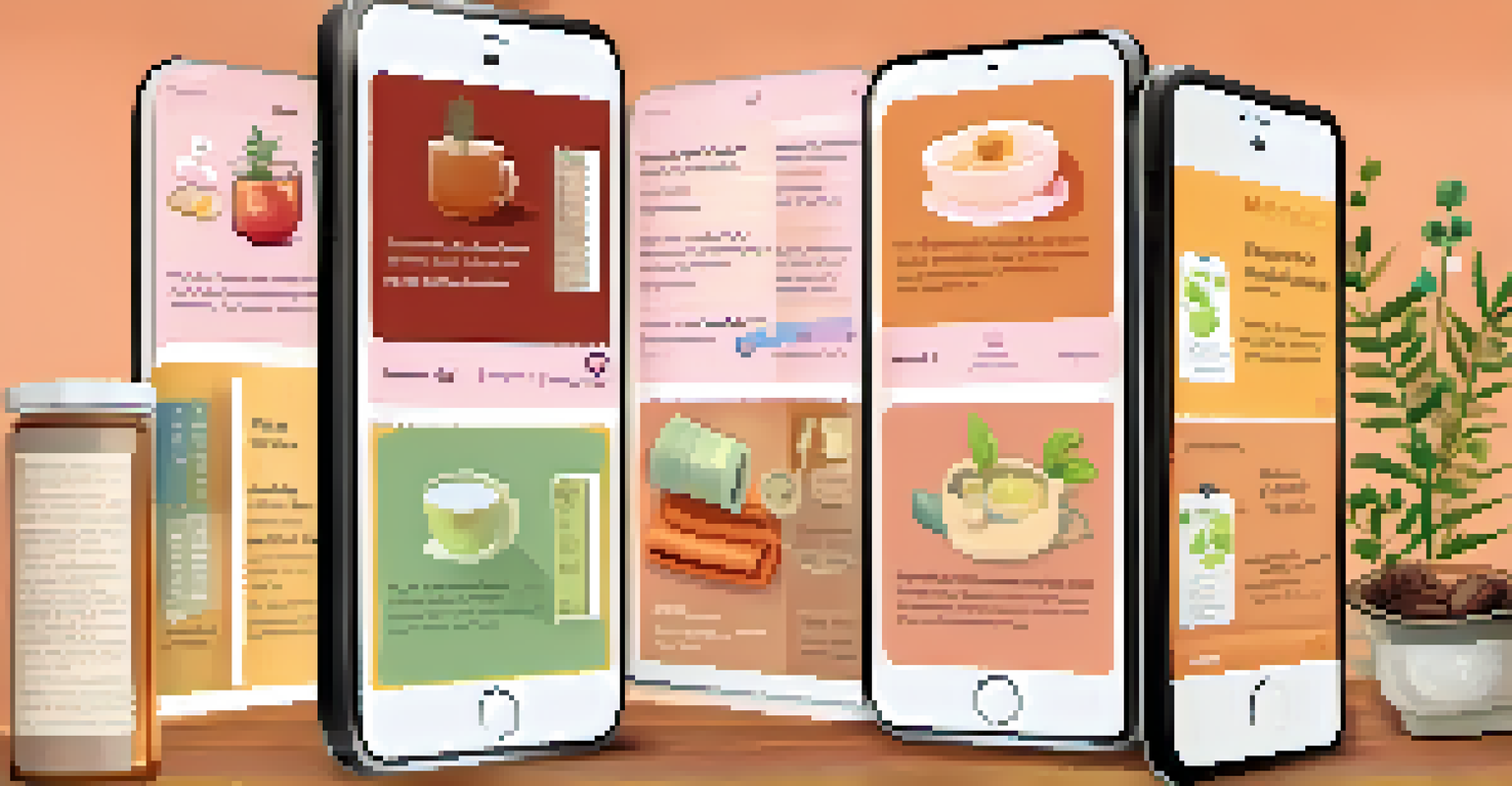Menopause and Technology: Apps and Tools for Support

Understanding Menopause: A Brief Overview
Menopause is a natural phase in a woman's life, typically occurring between ages 45 and 55. It marks the end of menstruation and is accompanied by various physical and emotional changes. Symptoms can include hot flashes, mood swings, sleep disturbances, and more, making this transition challenging for many women.
Menopause is not an end but a new beginning; it’s a time to embrace change and seek support.
While menopause is universal, every woman's experience is unique. Some may find themselves barely affected, while others might feel overwhelmed by the changes. Understanding what menopause entails can empower women to seek out tools and support that align with their individual needs.
This is where technology comes into play. With the rise of health apps and digital resources, women can now track their symptoms, access information, and connect with others going through similar experiences, making the menopause journey a bit smoother.
The Rise of Menopause Apps: What to Expect
In recent years, menopause-specific apps have emerged, designed to provide tailored support and information. These apps can help users track their symptoms, monitor hormonal changes, and even offer personalized advice. It's like having a health coach right in your pocket!

Many of these apps include features such as mood trackers, diet and exercise recommendations, and community forums where women can share their stories and tips. This sense of connection can alleviate feelings of isolation that often accompany this life stage.
Menopause is a Unique Journey
Every woman's experience with menopause varies, making understanding and support essential for navigating this life stage.
Moreover, the accessibility of these apps means that support is available at any time. Whether you're at home or on the go, you can easily check in on your health and well-being, making it a convenient option for busy lifestyles.
Top Menopause Apps to Consider
Several menopause apps stand out for their user-friendly interfaces and comprehensive features. One popular choice is 'Clio,' which allows users to log symptoms and receive tailored advice based on their entries. Another great option is 'MenoLife,' which combines symptom tracking with educational resources.
Technology has the power to connect us, especially during times of transition. Embrace the tools that empower you.
For those seeking community support, 'Menopause Chicks' offers a platform where women can connect, share experiences, and access expert advice. These apps not only provide practical solutions but also foster a sense of belonging among users.
Lastly, 'MyMeno' is a holistic app that focuses on wellness, including mindfulness practices and exercise routines tailored for menopausal women. With so many options available, it's essential to find an app that resonates with your personal needs and preferences.
Wearable Technology: A New Frontier in Menopause Support
Wearable technology, like smartwatches and fitness trackers, can complement menopause apps by providing real-time health data. These devices can monitor heart rate, sleep patterns, and physical activity, giving you a more comprehensive view of your health during menopause.
By syncing your wearable device with a menopause app, you can easily track how lifestyle factors impact your symptoms. For instance, if you notice increased hot flashes after a poor night's sleep, you can make adjustments to your routine accordingly.
Tech Tools for Menopause Support
Menopause-specific apps and wearable technology provide valuable resources and real-time data to help women manage their symptoms effectively.
This combination of technology not only enhances your understanding of your body but also empowers you to take proactive steps towards managing your health. It’s all about using the tools available to create a personalized health strategy.
Telehealth: Accessing Expert Advice from Home
Telehealth services have gained popularity, especially during the pandemic, providing women access to healthcare professionals without leaving home. This is particularly beneficial for those experiencing menopause, as they can consult with gynecologists and endocrinologists about their symptoms and treatment options.
These virtual appointments can be a game-changer, allowing women to discuss sensitive topics in a comfortable environment. Whether it’s hormone replacement therapy or lifestyle changes, having expert guidance can make navigating menopause less daunting.
Plus, many telehealth platforms offer educational resources and support groups, creating a holistic approach to menopause management. With just a few clicks, women can find both the information and the community they need to thrive during this transition.
Benefits of Online Support Groups for Menopause
Online support groups provide an invaluable space for women to share their menopause experiences and tips. Joining a group can foster a sense of community, reminding women they are not alone in facing the challenges of this life stage.
These groups often offer a wealth of knowledge, from coping strategies to recommendations for products and professionals. Members can share what worked for them, helping others navigate their own journeys more effectively.
Telehealth Enhances Access to Care
Telehealth services allow women to consult with healthcare professionals from home, facilitating discussions about menopause and treatment options.
Additionally, the anonymity of online forums can encourage open discussions about topics that might feel awkward in person. This candidness can lead to healing conversations and a deeper understanding of the menopause experience.
The Future of Menopause Support: Innovations on the Horizon
As technology continues to advance, we can expect even more innovative tools to support women during menopause. From AI-driven personalized health recommendations to virtual reality stress relief techniques, the future looks promising.
Researchers are also exploring the potential of telehealth to provide tailored hormonal treatments based on individual health profiles. This could revolutionize how menopause is managed, making it more personalized than ever.

Overall, the integration of technology in menopause support is a testament to the evolving understanding of women's health. With ongoing advancements, women can look forward to a more empowered approach to navigating menopause.